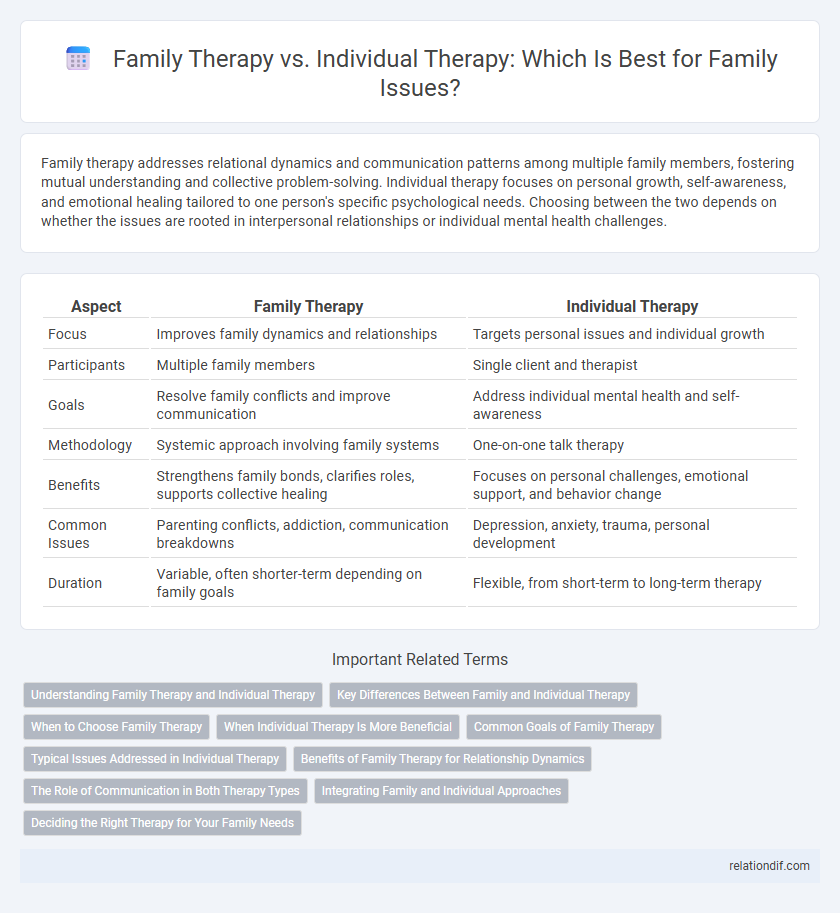Family therapy addresses relational dynamics and communication patterns among multiple family members, fostering mutual understanding and collective problem-solving. Individual therapy focuses on personal growth, self-awareness, and emotional healing tailored to one person's specific psychological needs. Choosing between the two depends on whether the issues are rooted in interpersonal relationships or individual mental health challenges.
Table of Comparison
| Aspect | Family Therapy | Individual Therapy |
|---|---|---|
| Focus | Improves family dynamics and relationships | Targets personal issues and individual growth |
| Participants | Multiple family members | Single client and therapist |
| Goals | Resolve family conflicts and improve communication | Address individual mental health and self-awareness |
| Methodology | Systemic approach involving family systems | One-on-one talk therapy |
| Benefits | Strengthens family bonds, clarifies roles, supports collective healing | Focuses on personal challenges, emotional support, and behavior change |
| Common Issues | Parenting conflicts, addiction, communication breakdowns | Depression, anxiety, trauma, personal development |
| Duration | Variable, often shorter-term depending on family goals | Flexible, from short-term to long-term therapy |
Understanding Family Therapy and Individual Therapy
Family therapy focuses on improving communication and resolving conflicts within the family unit by addressing relational dynamics among multiple members simultaneously. Individual therapy centers on personal growth and mental health by exploring an individual's thoughts, emotions, and behaviors in a one-on-one setting. Both approaches aim to promote emotional well-being but differ in scope and techniques tailored to collective versus personal challenges.
Key Differences Between Family and Individual Therapy
Family therapy involves multiple family members working together to address relational dynamics and collective issues, whereas individual therapy centers on a single person's personal challenges and mental health. Key differences include the scope of treatment, with family therapy targeting communication patterns and familial roles, and individual therapy focusing on self-exploration and personal growth. Family therapy sessions often include interaction among participants to foster understanding and resolve conflicts, contrasting the one-on-one setting of individual counseling.
When to Choose Family Therapy
Family therapy is ideal when relational dynamics contribute to emotional or behavioral issues, particularly in cases involving communication breakdowns, conflict resolution, or collective trauma. It effectively addresses patterns affecting multiple family members, strengthening support systems and fostering mutual understanding. Choose family therapy when individual problems are intertwined with family interactions or when systemic change is necessary for healing.
When Individual Therapy Is More Beneficial
Individual therapy is more beneficial when personal issues like anxiety, depression, or trauma require deep self-exploration or personalized coping strategies that may not involve family dynamics. It offers a confidential space for clients to express thoughts and emotions freely without external influence or pressure. This approach is particularly effective for clients seeking focused, tailored interventions targeting their unique psychological needs.
Common Goals of Family Therapy
Family therapy focuses on improving communication, resolving conflicts, and strengthening relationships among family members to create a supportive home environment. It addresses systemic patterns and dynamics, promoting collective problem-solving and emotional understanding. These common goals aim to enhance family functioning and foster healthier interactions compared to the individual-centered approach of personal therapy.
Typical Issues Addressed in Individual Therapy
Individual therapy commonly addresses personal issues such as anxiety, depression, trauma, and self-esteem challenges, providing a focused space for self-exploration and emotional regulation. Therapists work with clients to develop coping strategies for stress, improve interpersonal skills, and manage mental health disorders like PTSD, OCD, and mood disorders. This approach is particularly effective for clients seeking individualized support without the dynamics of family involvement.
Benefits of Family Therapy for Relationship Dynamics
Family therapy enhances communication and resolves conflicts by involving all members in a collaborative process. It strengthens emotional bonds and fosters mutual understanding through guided sessions that address collective issues. This approach promotes healthier relationship dynamics by creating a supportive environment for expressing feelings and learning effective problem-solving skills.
The Role of Communication in Both Therapy Types
Effective communication serves as the cornerstone in both family therapy and individual therapy, facilitating emotional expression and mutual understanding. Family therapy emphasizes open dialogue among members to resolve relational conflicts and improve dynamics, while individual therapy focuses on enhancing the client's self-awareness and articulation of personal experiences. Strengthening communication skills in both contexts promotes healthier relationships and emotional well-being.
Integrating Family and Individual Approaches
Integrating family and individual therapy approaches enhances treatment outcomes by addressing both personal issues and family dynamics, fostering comprehensive emotional healing. Family therapy facilitates communication and conflict resolution within the family system, while individual therapy targets personal psychological challenges and self-awareness. Combining these methods creates a holistic framework that supports long-term behavioral change and strengthens relational bonds.
Deciding the Right Therapy for Your Family Needs
Family therapy addresses relational dynamics and communication patterns among family members, fostering collective understanding and problem-solving. Individual therapy concentrates on personal growth and mental health issues specific to one person, providing tailored coping strategies. Evaluating the nature of challenges--whether they stem from interpersonal conflicts or individual struggles--guides the decision on which therapy best aligns with your family's unique needs.
Family therapy vs Individual therapy Infographic

 relationdif.com
relationdif.com